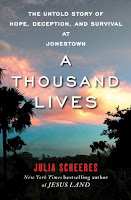
Alright, the final book of the series. I remembered really enjoying the Percy Jackson series way back when. I thought they were fun and creative, and they were an easy way to kill a bit of time. (My relationship at the time was starting to go south, so books are an easy way to avoid that shit storm.)
Whereas I do admire Rick's ambition to include Roman deities with an interesting way of introducing them into the Percy Jackson universe, I couldn't keep everyone's story straight, which is odd, because I'm usually pretty good about that. However, I have a sneaking suspicion it's because it was a big gap between reading The Mark of Athena and House of Hades, and I just didn't have the energy to re-read or revisit the other books before jumping in and finishing them.
Naturally, as I read the books, when one of the characters (Which btw, is very GOT, Riordan) makes a reference to someone else or another book, I sometimes remember but sometimes I don't... Sometimes I care when I don't remember, and then... sometimes I don't... and skim over until it becomes interesting again.
There are things that Rick does very well. He can write action superbly and does a great job of using Greek and Roman Mythology to tell a story, as well as set up a story for future books with Apollo. However, the character development fell flat during these series of books. During the Lightening Thief series, the reader has time to connect to Percy and Annabeth but in these books, Rick introduced a slew of new characters, wrote in their points of view all within the same time frame as the Lightening Thief series...and just didn't build that same connection.
The strange thing is that I didn't notice it until this book, where Piper and Annabeth have to go on a mini quest to get something... for something... in order to beat Gaea, who, once she wakes, will destroy the world. They set off to do this, and then have a conversation about boyfriends. See, Annabeth is dating Percy and Piper is dating Jason. Normally I would protest about having weird inappropriate conversations in life or death crisis, but in YA, that's not anything new.
Besides, when else can you have an conversation about the guy your dating if not trying to save the world?
Now back to the conversation by which, having two girls talk about boys isn't a bad thing. Girls talk about boys often. In House of Hades, a lot of terrible things happen to both Percy and Annabeth, and Piper wants to support her friend by talking about it. But before this conversation, I realized that I couldn't remember the last time Piper and Annabeth talked about well... anything. So instead of showing a connection between the two characters where they learn from each other, it's a device to further the plot so we can end the series already. Boo.
At least Riordan acknowledges that 14-16 years old date, whereas JK Rowling threw teenage hormones and sexual curiosity all in one book. He does a good job of having sort of be together for a bit and then come to their sense and kick some butt. So there's that, I guess.
However, it's a shame when it's revealed that Nico is in fact, gay, and has a crush on Percy Jackson (and confused as hell about it), it plays just like the conversation between Piper and Annabeth, reads like a device with a dash of
instead of anything with real meaning.
The ONLY relationship I was invested in was not even a real relationship: Leo and Calypso. I was really glad to see him find her again... but there was no epilogue! No 'several months' later sort of deal...
So, overall.. it's a good YA series and it's entertaining, once you accept the fact that it's aimed for the YA crowd and not for 20-somethings that wished one of their parents ended up being a Greek God.
...what? A girl can dream.









